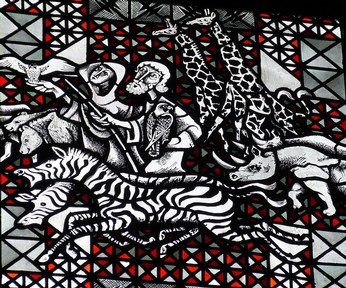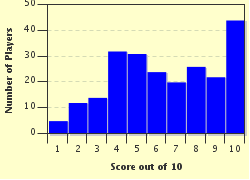Quiz Answer Key and Fun Facts
1. "There will be loud wailing throughout Egypt - worse than there has ever been or ever will be again. But among the Israelites not a dog will bark at any person or animal." (Exodus 11 v. 6-7)
Which event is being described in this quotation?
2. "'Separate those who lap the water with their tongues as a dog laps from those who kneel down to drink.' Three hundred of them drank from cupped hands, lapping like dogs." (Judges 7 v. 5-6)
What was the purpose of separating those that lapped like dogs?
3. "They washed the chariot at a pool in Samaria (where the prostitutes bathed), and the dogs licked up his blood, as the word of the Lord had declared." (1 Kings 22 v. 38)
Ahab and Jezebel were literally "going to the dogs" or so the prophet Elijah told them (1 Kings 21). The quotation above details the aftermath of Ahab's death but how did he die?
4. "There be three things which go well, yea, four are comely in going: A lion which is strongest among beasts, and turneth not away for any; A __________; an he goat also; and a king, against whom there is no rising up." (Proverbs 30 v. 31-32 - King James translation)
Only once does the King James translation refer to a specific breed of dog. Which name is missing from this quotation?
5. "Dogs surround me, a pack of villains encircles me; they pierce my hands and my feet."
These words are taken from a psalm that is said by Christians to prophesy the crucifixion of Jesus. Its opening line is quoted by Jesus on the cross: "My God, my God, why have you forsaken me?" Which psalm is it?
6. "As a dog returns to its ______, so fools repeat their folly." (Proverbs 26 v. 11)
Which word completes this proverb?
7. Most of the references in the Bible use the imagery of dogs in a negative way. There is, however, one man in the Apocrypha with his own pet dog. Who is this character, whose name is very similar to the book in which his story is found?
8. "He replied, 'It is not right to take the children's bread and toss it to the dogs.' 'Yes it is, Lord," she said. 'Even the dogs eat the crumbs that fall from their master's table.'"
Dogs feature in a theological debate between Jesus and a woman who sought healing for her daughter. What reason did Jesus give for initially resisting this request?
9. Dogs appear only once in Jesus' parables. Who is the poor man that dreams of eating the scraps that are given to the dogs?
10. "Watch out for those dogs, those evildoers, those mutilators of the flesh. For it is we who are the ___________ ..." (Philippians 3 v. 2-3)
Paul, like many before him, is quick to use the "D" word when he wants to do a bit of negative stereotyping. Which word completes this quotation?
Source: Author
glendathecat
This quiz was reviewed by FunTrivia editor
CellarDoor before going online.
Any errors found in FunTrivia content are routinely corrected through our feedback system.

